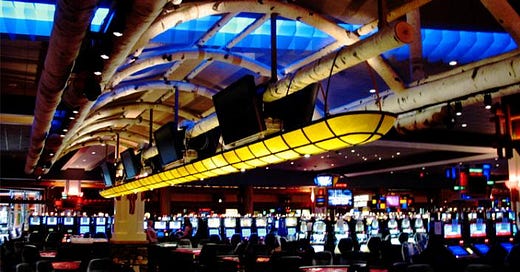Michigan gets extra attention in presidential election years. Donald Trump won the state in 2016 and Joe Biden in 2020; they were close contests, and Trump unsuccessfully sought to overturn his loss. When it comes to attention, being in a swing state has advantages.
As a state, Michigan has it all, the rustic Upper Peninsula, the urban sprawl in and around Detroit, productive farmland, and of course the Big Three — General Motors, Ford, and Stellantis (aka Chrysler).
But there is another big three as well: 827 cannabis outlets; twenty-seven casinos, nearly all controlled by Native American tribes; and breweries, distilleries, and vineyards too numerous really to count. Signs for all three venues dominate highways and byways.
In an era when so much focus is on social peril, I wondered why the pervasive presence of drugs, gambling, and alcohol as popular pastimes doesn’t much register as a problem intended to rile the bases, both right and left. These are interpretations of what I heard, in a considered but definitely informal survey.
Revenue: State taxes on cannabis sales and on casinos, breweries, and distilleries amount to hundreds of millions of dollars to augment the revenue declines from industry as Michigan’s mainstay. Cannabis money is returned to the communities, and the casinos commit to philanthropic assistance for neighboring libraries, schools, and other quality-of-life assets. All those pubs of various sizes provide employment.
The parking lots of all these venues are impressively full whenever they are open. In the case of the casinos, that is 24/7.
Leisure: Time off from most work schedules has increased. Michigan’s unemployment numbers, as in the rest of the country, are low. For all the attention on screen immersion, it turns out that when people relax — in all their own ways — they want places to go for fun. Nearly as I can tell, “smoking” is the activity that takes place outside public establishments by accepted order.
Democracy: The main qualification for entry is money to spend. The formerly modest country club near our house in Southwest Michigan now has an initiation fee of $45,000, plus the annual dues and a dress code. In our exceptionally divided times, I wonder how welcome I’d be where Legionnaires, Shriners, et al. gather, if my political opinions departed from their consensus. I did go to a MAGA Marathon for local candidates, but signed in under a bogus name to avoid being relentllessly fundraised.
The other state qualification for admission is age, twenty-one for cannabis and drinking, eighteen to gamble.
So, what do we make of activities that in the past — in the case of cannabis, the recent past — were illicit and are now everywhere? One of the things we have re-learned in the twenty-first century is that the upside of progress — take the internet — invariably has downsides. The state requires prominent notices about the dangers of addiction. My guess is that the people who would benefit from the warnings mostly ignore them.
The most striking example of how social patterns can change is cigarette smoking. From a majority of Americans adults in the mid-twentieth century who smoked regularly, the percentage nationally now is about 11 percent and lowest among the young, those aged eighteen to twenty-four. I remember when a quarter in the vending machine was enough to get a pack of twenty. A pack now costs an average of around $8, with a heavy percentage going to taxes.
Decades of pressure on the tobacco industry, stringent regulations, and the unequivocal health consequences of smoking have worked. Safety belts in cars are overwhelmingly used, and children’s car seats have reduced traffic fatalities — another upside of enforceable regulation.
The internet and its omnipresent social media platforms arrived so fast and were a combination of technology, entertainment, and profit baffling enough to overcome whatever efforts were made to control their impact. Now it is artificial intelligence that is either an enormous and positive addition to civilization or yet another contribution to its demise.
That gets us back to cannabis, casinos, and booze as a fact of life. The likelihood of doing away with these is zero, and of course too much of what is on offer can be devastating to the vulnerable. In the very long list of election-year issues — the economy, immigration, abortion, crime, heath care, disinformation — I see no indication of widespread concern about them.
Which leaves me with this fundamentally banal thought: Go ahead, enjoy what’s available — and to the extent possible don’t overdo it. We have definitely decided that prohibition made matters worse making us (whatever our political affiliation) libertarians in choosing how to enjoy our own time.
Ted Gioia, who writes a Substack called The Honest Broker, won the jackpot in commentary when a post of his became the basis for a David Brooks column in the New York Times called “The Junkification of America.”
This is Brooks’s observation about the topic at hand:
“The phenomenon Gioia describes isn’t happening just to culture; it recurs across American life. We have access to wonderful things. But they require effort, so we settle for the junky things that provide the quick dopamine hits. We could all be eating a Mediterranean diet, but instead it’s potato chips and cherry Coke. We could enjoy the richness of full awareness, but booze, weed and other drugs provide that quick reward. Think of all the things in American life that seem to offer that burst of stimulation but threaten to be addictive — gambling, porn, video games, checking email. “
Good. Bad. As we head into the November election, the reassuring mantra in our twenty-first-century nation is still “You Decide.”








This is what I would call a deeper dive. Peter's analysis of Michigan gets to issues, economics and political realities that are seldom explored.